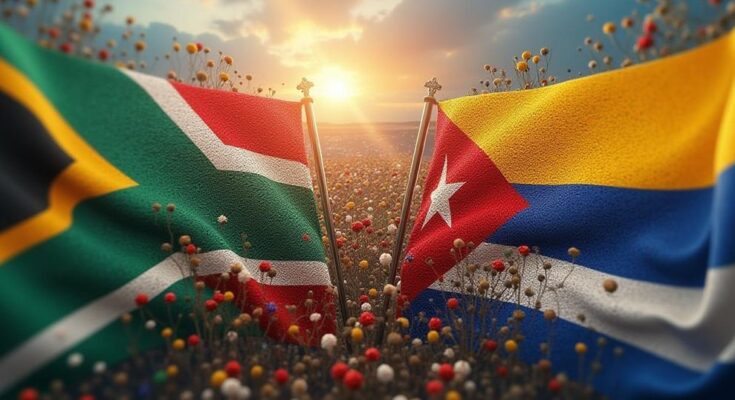During a ministerial meeting in Swakopmund, Namibia, on October 14 and 15, Foreign Ministers Peya Mushelenga of Namibia and Ronald Ozzy Lamola of South Africa expressed support for Cuba and Venezuela against U.S. sanctions, condemned Israel’s military actions in Lebanon, called for the removal of sanctions against Zimbabwe, and discussed the situation in Western Sahara, endorsing a recent EU court ruling.
On October 14 and 15, in Swakopmund, Namibia, the Foreign Ministers of Namibia, Peya Mushelenga, and South Africa, Ronald Ozzy Lamola, convened to express their steadfast support for Cuba and Venezuela, both of which are enduring significant economic challenges attributed to unilateral sanctions. The ministers particularly highlighted the long-standing economic, financial, and commercial blockade imposed upon Cuba by the United States, which has persisted for over sixty years, and they collectively called for the cessation of this enduring policy. In addition to their support for the Latin American nations, the meeting also condemned Israel’s military actions in Lebanon, branding them as severe violations of sovereignty and international humanitarian law, thus demanding that the international community and the United Nations Security Council enforce the adherence to international law. Moreover, the two nations articulated the urgent necessity for the immediate and unconditional removal of illegal sanctions against Zimbabwe, which they indicated are detrimental to the socioeconomic progress of both Zimbabwe and the broader Southern African region. The discussion also encompassed the situation in Western Sahara. The ministers welcomed the recent ruling from the Court of Justice of the European Union (CJEU) on October 4, 2024, which indicated that the European Commission had indeed violated the rights of the Sahrawi people to self-determination.
The context of the meeting between South Africa and Namibia is significant, considering the historical alignment of these nations with Cuba and Venezuela, both of which are known for their resistance against perceived imperialist pressures and sanctions imposed by the United States. The economic blockade against Cuba has been a particularly critical international issue, drawing condemnation from various nations and international organizations over the decades. Additionally, the issue of sanctions imposed on Zimbabwe adds another layer of complexity, as these sanctions are seen as hindrances to sustainable development in the region. The discussion surrounding Western Sahara reflects ongoing geopolitical disputes and the importance of self-determination as a principle of international law.
In summary, the meeting between the Foreign Ministers of Namibia and South Africa underscored their countries’ commitment to supporting Cuba and Venezuela against economic sanctions. Additionally, it highlighted the necessity for upholding international humanitarian law and addressing the detrimental effects of sanctions on Zimbabwe. The dialogue on Western Sahara further illustrates regional efforts to assert the right to self-determination. This collaborative stance reflects both nations’ dedication to promoting justice and equity on the international stage.
Original Source: www.plenglish.com




